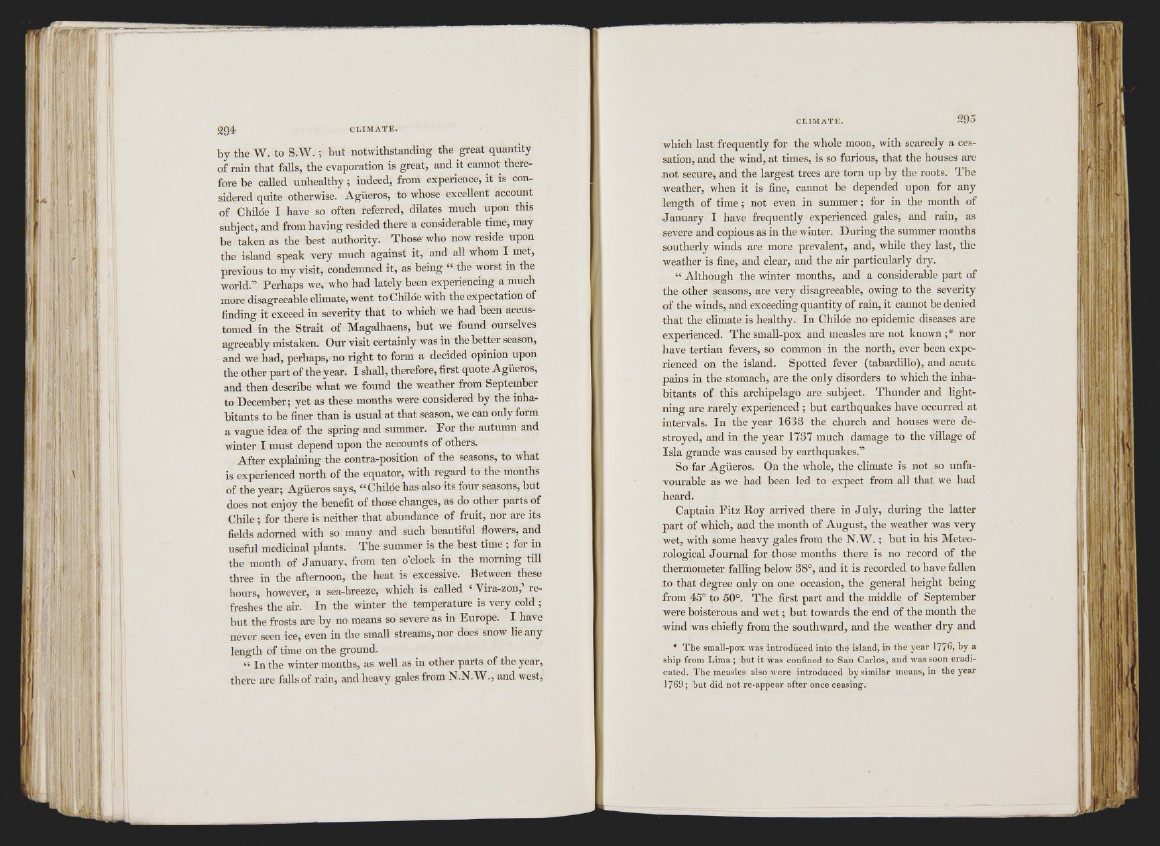
by the W. to S.W. ; but notwithstanding the great quantity
of rain that falls, the evaporation is great, and it cannot therefore
be called unhealthy ; indeed, from experience, it is considered
quite otherwise. Agüeros, to whose excellent account
of Childe I have so often referred, dilates much upon this
subject, and from having resided there a considerable time, may
be taken as the best authority. Those who now reside upon
the island speak very much against it, and all whom I met,
previous to my visit, condemned it, as being “ the worst in the
world." Perhaps we, who had lately been experiencing a much
more disagreeable climate, went to Childe with the expectation of
finding it exceed in severity that to which we had been accustomed
in the Strait of Magalhaens, but we found ourselves
agreeably mistaken. Our visit certainly was in the better season,
and we had, perhaps, no right to form a decided opimon upon
the other part of the year. I shall, therefore, first quote Agüeros,
and then describe what we found the weather from September
to December; yet as these months were considered by the inhabitants
to be finer than is usual at that season, we can only form
a vague idea of the spring and summer. For the autumn and
jvinter I must depend upon the accounts of others.
After explaining the contra-position of the seasons, to what
is experienced north of the equator, with regard to the months
of the year; Agüeros says, “ Childe has also its four seasons, but
does not enjoy the benefit of those changes, as do other parts of
Chile ; for there is neither that abundance of fruit, nor are its
fields adorned with so many and such beautiful flowers, and
useful medicinal plants. The summer is the best time ; for in
the month of January, from ten o’clock in the morning till
three in the afternoon, the heat is excessive. Between these
hours, however, a sea-breeze, which is called ‘ Vira-zon,’ refreshes
the air. In the winter the temperature is very cold ;
but the frosts are by no means so severe as in Europe. I have
never seen ice, even in the small streams, nor does snow lie any
length of time on the ground.
“ In the winter months, as well as in other parts of the year,
there are falls of rain, and heavy gales from N.N.W., and west.
! : r
7 J ¿ ■
which last frequently for the whole moon, with scarcely a cessation,
and the wind, at times, is so furious, that the houses are
not secure, and the largest trees are torn up by the roots. The
weather, when it is fine, cannot be depended upon for any
length of time; not even in summer; for in the month of
January I have frequently experienced gales, and rain, as
severe and copious as in the winter. During the summer months
southerly winds are more prevalent, and, while they last, the
weather is fine, and clear, and the air particularly dry.
“ Although the winter months, and a considerable part of
the other seasons, are very disagreeable, owing to the severity
of the winds, and exceeding quantity of rain, it cannot he denied
that the climate is healthy. In Chiloe no epidemic diseases are
experienced. The small-pox and measles are not known ;* nor
have tertian fevers, so common in the north, ever been experienced
on the island. Spotted fever (tabardillo), and acute
pains in the stomach, are the only disorders to which the inhabitants
of this archipelago are subject. Thunder and lightning
are rarely experienced ; hut earthquakes have occurred at
intervals. In the year 1633 the church and houses were destroyed,
and in the year 1737 much damage to the village of
Isla grande was caused by earthquakes.’’
So far Agüeros. On the whole, the climate is not so unfavourable
as we had been led to expect from all that we had
heard.
Captain Fitz Roy arrived there in July, during the latter
part of which, and the month of August, the weather was very
wet, with some heavy gales from the N .W .; but in his Meteorological
Journal for those months there is no record of the
thermometer falling below 38°, and it is recorded to have fallen
to that degree only on one occasion, the general height being
from 45° to 50°. The first part and the middle of September
were boisterous and wet; but towards the end of the month the
wind was chiefly from the southward, and the weather dry and
* The small-pox was introduced into the island, in the year 1776, hy a
ship from L im a ; hut it was confined to San Carlos, aud was soon eradicated.
The measles also were introduced by similar means, in the year
1769; but did not re-appear after once ceasing;.
I i i , - !